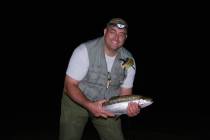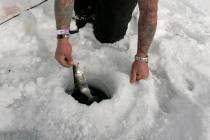Portable fish finders assist anglers
Bodies of water the size of Lake Mead and Lake Mohave can be intimidating, not only to new anglers but also to anglers who have spent their fishing lives on much smaller lakes or reservoirs. While it's true that fish are where you find them, learning where to find fish on waters as large as Lake Mead and Lake Mohave sometimes can be a challenging proposition.
Perhaps the best methods for learning new waters is to strike up a friendship with someone who already knows them and is willing to share what they know, or you can hire a guide. Another option is to simply observe other anglers and fish where they fish, but there is no guarantee they know what they're doing, either. You could simply end up following the crowd.
In the old days, if you didn't have someone who was willing to mentor your efforts, you just fished and moved until you finally figured out where the fish tended to hang out. While this technique provided the opportunity to fish a lot of water, and learn what to look for when fishing for a particular species, it wasn't always productive. Then along came sonar technology tailored to the recreational angler and the learning process was drastically reduced. These recreational-grade sonar devices simplified the fish-finding process and reduced unproductive fishing time.
There was a time when I looked upon fish-finding sonar as a means of cheating the outdoor system, a violation of the fair-chase ethic, but it didn't take me more than a couple of hours on my friend's boat to figure out this really wasn't the case. While it's true that sonar units cut down on the finding part of fishing, they don't do a whole lot to help with the catching part of fishing. That's where the bait selection and presentation skill set still comes into play. Just because you can see a fish doesn't mean you can catch it.
Few things are more frustrating than knowing there is a fish down there at the 65-foot mark, but you're unable to goad him into taking your bait.
Through the years, fish finders have evolved from offering a simple monochrome screen with blips indicating the presence of fish to full-color renditions of the structure beneath the surface. With today's technology, you can even watch the fish reject your anchovy.
Historically, recreational sonar devices were large and required the power supplied by large marine batteries to function. Though this was not a problem for owners of full-size vessels, it was a little impractical for the growing number of fishermen in canoes, kayaks and even float tubes. As the number of anglers using these smaller crafts steadily increased, so, too, did the demand for downsized fish finders, and it wasn't long before enterprising companies such as Humminbird, Lowrance and MarCum Technologies identified the need for small sonar devices that get by on an equally compact power supply.
MarCum's newest addition is the Showdown Ice Troller. No larger than a walkie-talkie, the Troller runs for as many as 20 hours on only six AA batteries. Though it was designed and marketed for ice fishing, anglers fishing from paddle craft have added the portable fish finder to their list of equipment. One of the Troller's selling features is the ability of its transducer to fire through the hull, and it can be mounted using epoxy rather than a drill and screws. But it doesn't have to be mounted to work.
Lowrance offers the X-4 and the X-4 Portable. The latter operates on eight D-cell batteries and offers a 4-inch grayscale screen. Humminbird seeks to fill the kayakers' and float tubers' needs with its Fishin' Buddies line. The most expensive Fishin' Buddie offers a 4-inch color screen. These downsized sonar options sell from less than $100 to about $300.
Freelance writer Doug Nielsen is a conservation educator for the Nevada Department of Wildlife. His "In the Outdoors" column, published Thursday in the Las Vegas Review-Journal, is not affiliated with or endorsed by the NDOW. Any opinions he states in his column are his own. He can be reached at intheoutdoorslv@gmail.com.

















